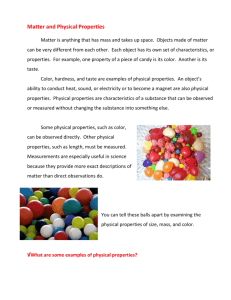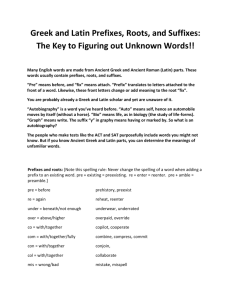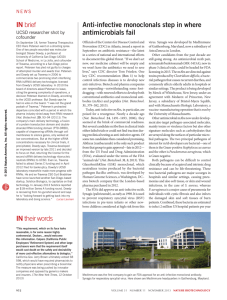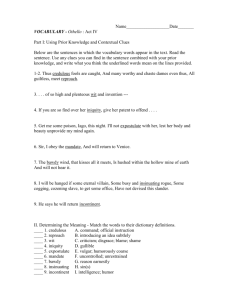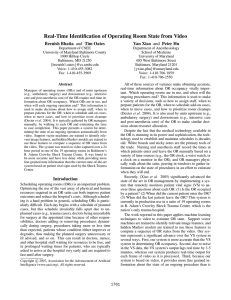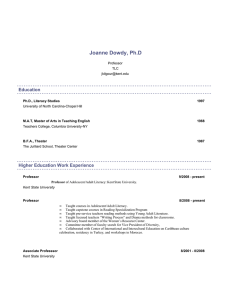Romeo and Juliet Vocabulary List #1 (from Vocabulary.com
advertisement
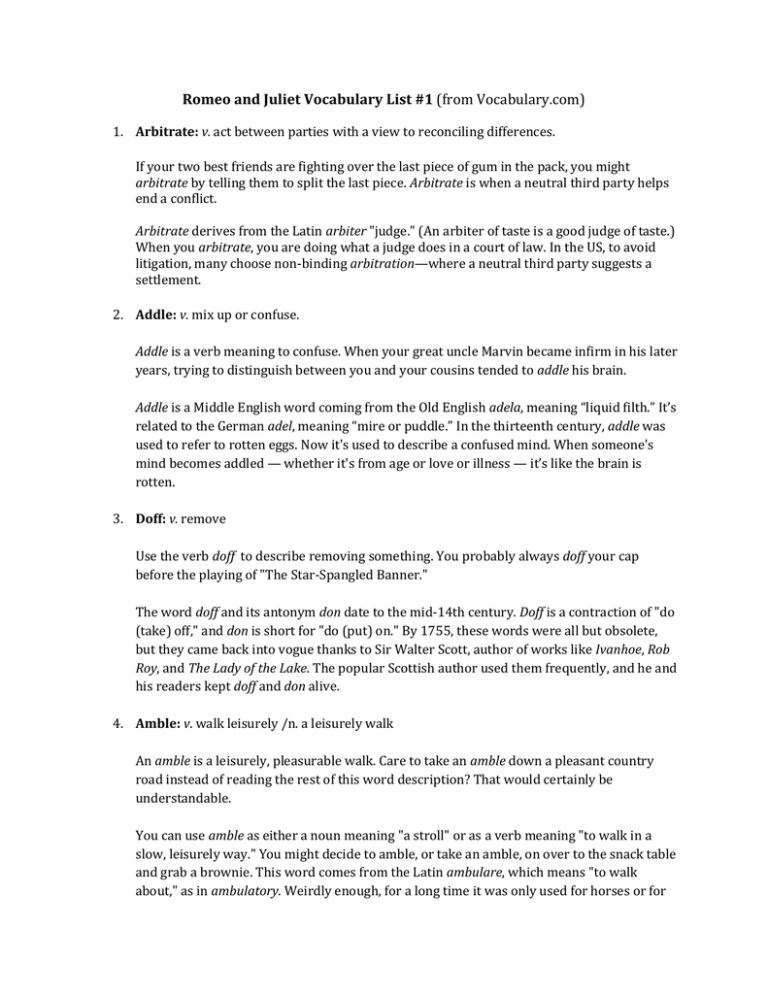
Romeo and Juliet Vocabulary List #1 (from Vocabulary.com) 1. Arbitrate: v. act between parties with a view to reconciling differences. If your two best friends are fighting over the last piece of gum in the pack, you might arbitrate by telling them to split the last piece. Arbitrate is when a neutral third party helps end a conflict. Arbitrate derives from the Latin arbiter "judge." (An arbiter of taste is a good judge of taste.) When you arbitrate, you are doing what a judge does in a court of law. In the US, to avoid litigation, many choose non-binding arbitration—where a neutral third party suggests a settlement. 2. Addle: v. mix up or confuse. Addle is a verb meaning to confuse. When your great uncle Marvin became infirm in his later years, trying to distinguish between you and your cousins tended to addle his brain. Addle is a Middle English word coming from the Old English adela, meaning “liquid filth.” It’s related to the German adel, meaning “mire or puddle.” In the thirteenth century, addle was used to refer to rotten eggs. Now it's used to describe a confused mind. When someone's mind becomes addled — whether it's from age or love or illness — it’s like the brain is rotten. 3. Doff: v. remove Use the verb doff to describe removing something. You probably always doff your cap before the playing of "The Star-Spangled Banner." The word doff and its antonym don date to the mid-14th century. Doff is a contraction of "do (take) off," and don is short for "do (put) on." By 1755, these words were all but obsolete, but they came back into vogue thanks to Sir Walter Scott, author of works like Ivanhoe, Rob Roy, and The Lady of the Lake. The popular Scottish author used them frequently, and he and his readers kept doff and don alive. 4. Amble: v. walk leisurely /n. a leisurely walk An amble is a leisurely, pleasurable walk. Care to take an amble down a pleasant country road instead of reading the rest of this word description? That would certainly be understandable. You can use amble as either a noun meaning "a stroll" or as a verb meaning "to walk in a slow, leisurely way." You might decide to amble, or take an amble, on over to the snack table and grab a brownie. This word comes from the Latin ambulare, which means "to walk about," as in ambulatory. Weirdly enough, for a long time it was only used for horses or for those on horseback. We use it for people now, but it still retains some of its horse-like country feel. 5. Dowdy: adj. lacking in smartness or taste. Someone dowdy dresses badly and has a shabby, unstylish appearance. If you can’t remember the last time you went shopping, beware, you may be dowdy. People tend to use the word dowdy mostly to describe women, in particular older women. In addition, it not only means shabbily dressed, but also relates specifically to the idea of style, or rather the lack of it. Applied to clothing, it also means out of date, in an oldfashioned, dull sort of way. Wild 1970s-style love beads may be out of style, but they can never be called dowdy! A sensible gray tweed skirt or the person wearing it? Most likely dowdy! 6. Bawdy: adj. humorously vulgar Bawdy describes humor that is off-color: about going to the bathroom, or other naughty, vulgar topics. Things that are bawdy are a little inappropriate, intended to be funny, and definitely not the kind of things you want to say in school. Still, they're not the worst sort of things you could say. This is a playful word for things that are vulgar and funny, but not nearly as bad as an xrated movie. Bawdy jokes are inappropriate, because they discuss things that are gross, but they're not totally explicit. Being bawdy is a little like being slangy and jokey at the same time. Whether such bawdiness is appropriate all depends on who you're talking to. 7. Garish: adj. tastelessly showy Use the adjective garish to describe something that is overly vivid, bright, showy, and in bad taste — like the DJ's garish outfit that is a flashback to the disco era. Garish comes to English from the Old Norse word gaurr, meaning "rough fellow." It is often used to describe colors, clothing, decorations, and other things that can be elegant and tasteful. Because the word connotes bad taste, however, it is rarely used in a complimentary way. If you say to your friend, "I like your garish hair and makeup," she is not likely to take it well, unless, of course, you are going to a 70s flashback party.
